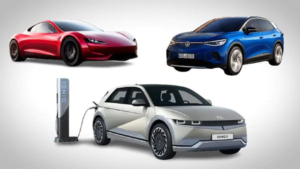
Electric vehicles (EVs) are automobiles powered by electricity rather than traditional internal combustion engines that rely on gasoline or diesel. They are considered an eco-friendly alternative to conventional vehicles due to their lower carbon emissions and reduced dependence on fossil fuels. Here are some key aspects of EV cars:
- Battery-Powered: EVs run on rechargeable lithium-ion battery packs. These batteries power an electric motor that drives the vehicle. The batteries are rechargeable, typically through plugging into a power source.
- Zero Emissions: Electric vehicles produce zero tailpipe emissions, which helps reduce air pollution and greenhouse gas emissions. However, it’s important to consider the source of electricity used for charging, as this can impact overall emissions.
- Range: The distance an EV can travel on a single charge varies depending on the vehicle model and battery capacity. Modern EVs generally have ranges between 100 to over 300 miles per charge, with advancements in battery technology continually extending this range.
- Charging Infrastructure: Charging an EV can be done at home using a standard electrical outlet or through dedicated charging stations. Public charging networks are expanding, providing faster charging options at various locations, including shopping centers, parking lots, and along highways.
- Types of EVs:
- Battery Electric Vehicles (BEVs): Pure electric vehicles that solely run on electricity.
- Plug-In Hybrid Electric Vehicles (PHEVs): These vehicles use both an electric motor and an internal combustion engine. They can be charged via an outlet but also have a gasoline engine for extended range.
- Performance: Electric vehicles often have instant torque, providing quick acceleration and a smooth driving experience. They are known for their quiet operation and reduced vibration compared to traditional vehicles.
- Cost Considerations: While the initial cost of purchasing an EV might be higher than that of a traditional car, there are potential cost savings over time due to lower maintenance and fuel costs. Government incentives and rebates in some regions can also offset the purchase price.
- Environmental Impact: While EVs produce zero emissions during operation, the manufacturing process of batteries and electricity generation may have environmental impacts. Efforts are ongoing to improve the sustainability of battery production and increase the use of renewable energy sources.
- Advancements and Future Trends: Research and development continue to enhance battery technology, aiming to increase energy density, reduce costs, and improve charging speeds. Additionally, there’s ongoing innovation in autonomous driving and vehicle-to-grid technologies in the EV sector.
The popularity and adoption of electric vehicles are growing globally, driven by environmental concerns, government policies promoting cleaner transportation, technological advancements, and increasing consumer interest in sustainable mobility options.



Leave a Reply